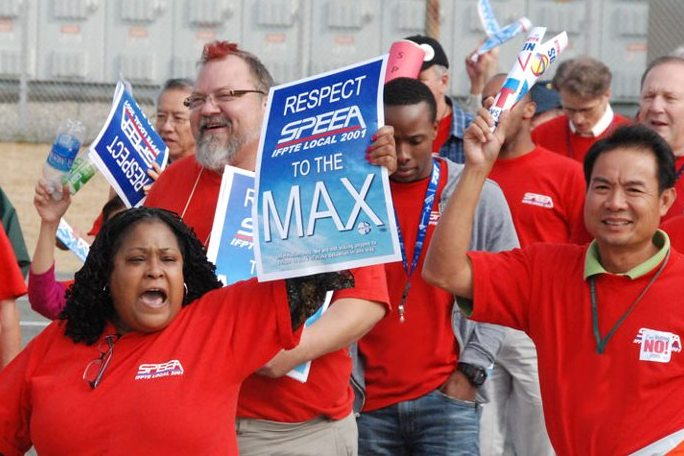Boeing’s ‘Angry Nerds’ Reject Contract as Dreamliner Crisis Continues

Engineers and technical workers at Boeing split a vote on their new contract, with the technical unit rejecting the offer and voting to authorize a strike. The workers are essential to fixing Boeing's 787 Dreamliner, which has been grounded due to battery fires. Photo: SPEEA.
Seven thousand technical workers at Boeing narrowly rejected the aircraft company’s final contract offer on Tuesday and authorized a strike.
The possible strike comes as Boeing struggles to fix problems with its new Dreamliner 787, which was grounded by aviation authorities around the world in mid-January after batteries malfunctioned on two planes, smoking and catching fire.
The techs who voted down the contract are intimately involved in solving the battery problem, said Ray Goforth, executive director of the union—a fact which could give them leverage.
“All commercial aircraft production will halt if they go on strike,” he said.
No date has been set for a walkout, and the union is asking Boeing to meet again with a federal mediator. The workers are members of the Society of Professional Engineering Employees in Aerospace, SPEEA, whose unofficial slogan is, “No nerds, no birds.”
Split Decision
The technical workers’ position is shakier than the last time they struck, in 2000, because a larger sister unit of 15,500 engineers narrowly voted to accept the contract.
The union’s negotiating team recommended that the workers reject both contracts because Boeing is pushing a two-tier pension system on all of its 23,000 engineering and technical employees. New hires would be relegated to a 401(k), saving the company 40 percent on their pensions, according to the union.
“I'm disappointed. We sold out the new hires and in turn they will sell us out,” commented Tom Georger III on SPEEA’s Facebook page, reacting to the engineering unit’s vote.
“If you have the pension now, and don’t care what the new hires get, that greed will hit you hard in the future,” commented Chris Johnson. “Boeing has its eyes on slashing your pension next.”
Johnson predicted Boeing will hire lots of new workers in the next few years—and these new hires will dilute the vote of workers who want to defend the old pension plan.
Boeing’s CEO, James McNerney, is doing double duty: attacking retirement security for his own employees, and for the whole country at the same time. He chairs the Business Roundtable, which is trying to raise the age of eligibility for Medicare to 70 years old for those currently under 55.
The 27,000 Boeing production workers who are represented by the Machinists (IAM) have been able to retain their defined benefit pensions.
Outsourcing Problems
Outsourcing has been a sore issue for SPEEA members, and they blame it for production delays and the 787’s battery problems.

SUPPORT LABOR NOTES
BECOME A MONTHLY DONOR
Give $10 a month or more and get our "Fight the Boss, Build the Union" T-shirt.
“Boeing corporate created the 787 problems by ignoring the warnings of the Boeing technical community,” said Joel Funfar, a tech who is on the negotiating team.
He criticized the company’s plan to fix the planes. “They propose to double down on their failed outsourcing strategy by outsourcing the engineering work required to solve the problems caused by previous rounds of outsourcing,” he said.
Further outsourcing may weaken the techs’ leverage in a strike, but it’s also risky for the company, which spent extra billions and suffered three years of delays when its rampant outsourcing went awry.
Boeing is flush with cash due to deliveries of new planes, but the mysterious problems with the 787 added uncertainty to the negotiations, and may have pushed some SPEEA members to vote for the contract.
“With the 787 grounded, the future of the company’s at risk, and it made a lot of people nervous,” said Goforth. “If it takes a two-year redesign, people were afraid the money on the table might disappear.”
The union argued for extending the existing contract so the workers could focus on the 787’s problems, but Boeing rejected that offer January 17, driving the contract to a vote. The techs voted 53 percent to reject, while the engineering unit voted 54 percent to accept.
They’ve been working without a contract since November, when both units of self-described “angry nerds” rejected the company’s first offer by 96 percent. Both sides agreed to keep negotiating, until the company pushed its final offer—with the pension poison pill—in January.
Contract Gains
Over the months, SPEEA made progress on raises, and salvaged medical benefits. The union is also proud to have extended pension coverage to same-sex married couples, since Washington State recently approved same-sex marriage. Most of the workforce affected by the contract lives in Washington.
The gains came partly from shop floor actions like lunchtime marches and the “10/2 clap.” At 10 a.m. and 2 p.m., workers stop work and start clapping at their desks for a minute—they don’t leave their cubicles, but everyone can hear each other, and so can management.
Signs have sprouted on workers’ desks, including one that reads: “Dear Engineers and Techs: Thank you for the record profits. We are not interested in sharing them with you. Sincerely, Boeing Corporate.”
The tech vote was close. Then again, in 2000, the strike authorization vote was under 51 percent, according to the union, but 95 percent of the workers walked out and stayed out for 40 days.
But with the engineers having voted to approve the new pension scheme, “Boeing is likely to lock up on that issue,” Goforth said. “We’ll either find a third way or go on strike.”

